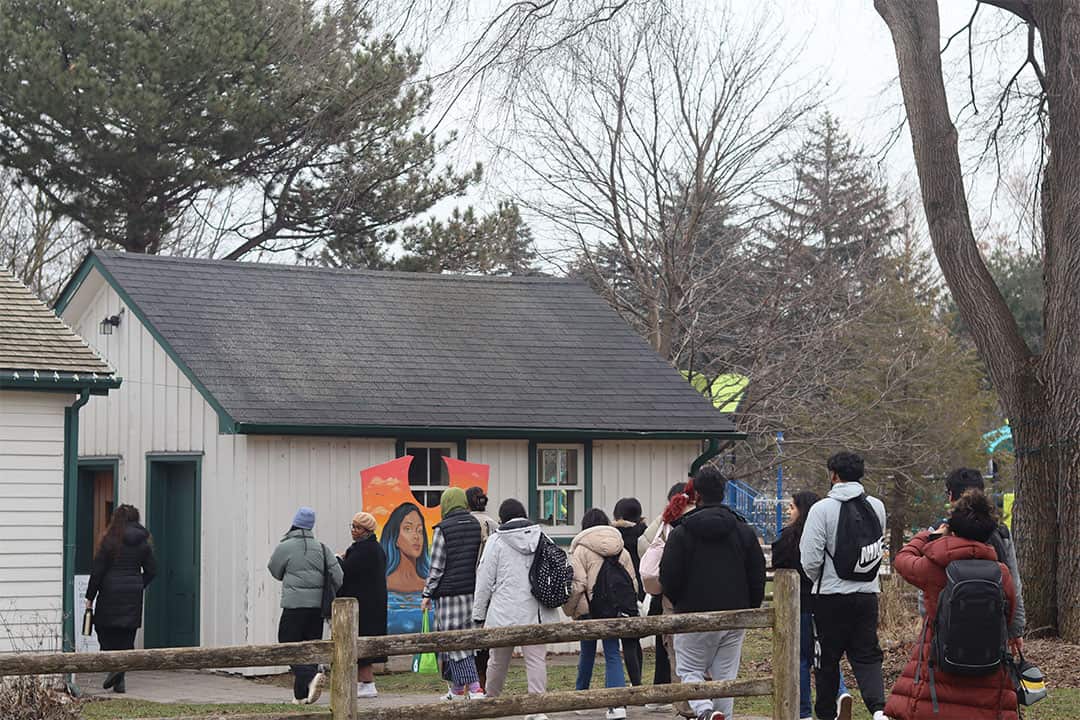On January 31, 17 U of T students visited the Scarborough Museum in Thomson Memorial Park to tour an exhibit put on by the Queer Tamil Collective (QTC) — a nonprofit, Toronto-based organization that supports, empowers, and advocates for LGBTQ+ Tamil artists, focusing on the violence that individuals face carrying these intersectional identities.
The event coincided with Tamil Heritage Month. Tamil refers to both a language and an ethnic group. Many Tamil people practice Hinduism, while some practice Jainism, Christianity, and Islam.
The language is spoken primarily by people from southern India and Sri Lanka. The Indian government declared Tamil a “classical language,” meaning that the language appears in ancient literature and transcripts as far back as 1,500–2,000 years ago.
In 2014, Ontario’s Legislative Assembly passed Bill 165, designating January as Tamil Heritage Month to celebrate the political, economic, and cultural contributions Tamil Canadians have made to Ontario.
Scarborough Campus Student Union (SCSU) President Amrith David decided to organize the tour. “I wanted to bring students in this space, not just for them, but for myself as well to learn about what the different identit[ies are] of being Queer, and how that plays into the whole Tamil heritage,” David, who is Tamil, told The Varsity.
SCSU collaborated with the Scarborough Museum and the U of T Tamil Student Association (TSU) to bring the students on the tour, where they viewed art from a variety of artists across the world.
History in the making
The exhibition, titled “ஊர்,” or “Oor,” included 11 artworks — ranging from ceramic statues to paintings to films — from LGBTQ+ Tamil artists from eight different countries or regions: Canada, the UK, Germany, Sri Lanka, Malaysia, Singapore, Guadeloupe, and Trinidad.
According to the exhibition catalogue, “Oor is a multifaceted Tamil word that could mean location, village, home, and identity.” With the exhibit — which ran from June 2023 and closed at the end of January — the QTC aimed to explore topics including identity, belonging, sexuality, displacement, genocide, colonialism, caste, and class.
In Sri Lanka — where more than five million people speak Tamil and Tamil people make up the largest minority group — homosexuality remains illegal and punishable by prison. In May 2023, however, Sri Lanka’s Supreme Court found a bill seeking to decriminalize homosexuality not inconsistent with its constitution — in other words, constitutional — clearing the way for parliamentary debate and vote. In the exhibition catalogue provided by QTC, the collective shares that some members of the QTC have been “disowned, shunned, and ostracized” by Tamil communities because of their LGBTQ+ identities.
“Opened my mind”
One of the pieces that caught students’ attention was a giant banner created at the inaugural Queer Tamil Pride event hosted in June 2022 at the Scarborough Museum. The banner included a glossary of LGBTQ+ affirming words in Tamil translated to English, overlaid with coloured handprints. According to the QTC digital catalogue on the exhibit, the banner symbolized welcoming and validating those with LGBTQ+ identities.
Tamil students during the tour discussed the translations of some of the Tamil words on the banner that describe LGBTQ+ identities, and whether they were derived from Old Tamil — spoken from before 200 BCE to 700 CE — or Medieval Tamil, which historians consider developed into Modern Tamil in the fourteenth century.
“No one really talks about the Queer aspect,” Lackzhanth Anantharajah, a second-year majoring in city studies and a member of the TSU, told The Varsity. “Coming here, it really opened my mind to see how prevalent it is, in our society.”
David liked how pieces in the exhibit demonstrated a form of resistance against censorship. “These [artists] are doing the work to resist colonial powers and resist ‘the ways that things have to be done,’ which I really appreciate,” explained David.




No comments to display.